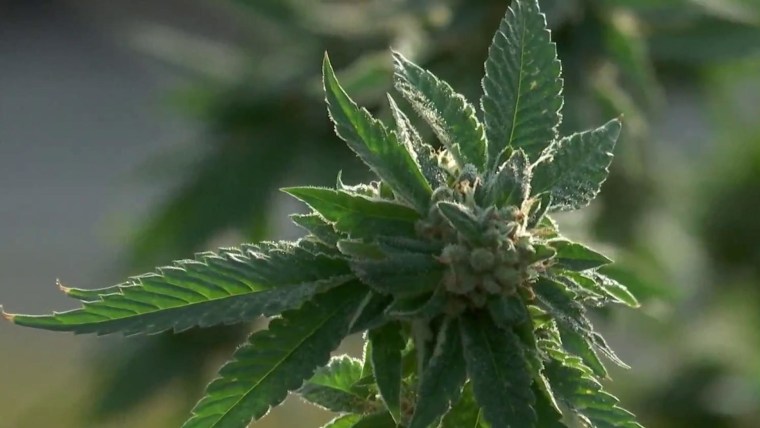LOS ANGELES — Cannabis advocates, small farmers and business owners called Thursday for an overhaul of the California marijuana tax system as they struggle to keep afloat amid rising operating and regulatory costs.
They gathered outside the State Capitol in Sacramento to make their case and warn that the industry could collapse if steps aren’t taken soon.
“We’re here today because the craft cannabis industry here in California is in crisis and on the brink of collapse,” said Amber Senter, a co-founder and the executive director of Supernova Women, a nonprofit organization that works to create opportunities for people of color in the industry.
“Not only has the state fallen short in promises to right the wrongs inflicted upon Black and brown communities impacted by the war on drugs, but it has also perpetuated regressive war-on-drugs 2.0 policies through oppressive taxation, which must end,” Senter said in a statement. “This is our cry and plea for help.”
Senter and others are asking the Legislature and Gov. Gavin Newsom to eliminate the cultivation tax and repeal the state’s excise tax for social equity retailers.
Thursday’s rally built on momentum created by industry leaders who also demand that California change the way it taxes cannabis. Last month, marijuana companies warned Newsom in a letter that immediate tax cuts and a rapid expansion of retail outlets were needed to steady an increasingly unstable marketplace shaken by illicit dealers and growers.
More than two dozen cannabis executives and legalization advocates signed the letter after years of complaints that the heavily taxed industry is unable to compete with the widespread illegal economy, which offers far lower consumer prices and has double or triple the sales of the legal market.
Proposition 64, which voters approved in 2016 and legalized cannabis, “was not passed simply to raise tax revenue, but to end the illicit market, protect public health and safety, and create an accountable legal industry,” the executives said in the letter. “Yet today, four years after the start of legal sales, our industry is collapsing and our global leadership and legacy is at the brink of disappearing forever.
“The opportunity to create a robust legal market has been squandered as a result of excessive taxation,” they continued. “75% of cannabis in California is consumed in the illicit market and is untested and unsafe.”
The state’s tax system has burdened small businesses from the start, operators and experts say. As of Jan. 1, cannabis is taxed at a flat rate of about $161 a pound, on top of a 15 percent excise tax, as well as local cultivation, manufacturing, processing, distribution and retail taxes.
Newsom, who supported Proposition 64 as lieutenant governor, signaled this week that help may be on the way. Unveiling his 2022-23 budget proposal Monday, he said he supported cannabis tax reform and planned to work with the Legislature to modify policy.
“It is my goal to look at tax policy to stabilize the market,” he said. “At the same time, it is also my goal to get these municipalities to wake up to the opportunities to get rid of the illegal market, the illicit market, and provide support in a regulatory framework for the legal market.”
Assembly member Mia Bonta, a Democrat who represents the eastern San Francisco Bay area, said at Thursday’s rally that reforming the cannabis regulations is about ensuring social justice, equity and representation in an industry that has been dominated for years by white men but has harmed predominantly Black and Latino people.
Several cannabis businesses in Bonta’s district were robbed at gunpoint in November, losing about $5 million in the days leading up to Thanksgiving. Henry Alston, a co-founder and the chief operating officer of James Henry SF, a cannabis company in Oakland, said his businesses were broken into five times in the spate of robberies.
“They took everything,” he said. “They dragged our safe with our tax money right out the front door.”
Casey O’Neill, the owner and operator of Happy Day Farms in Mendocino County, said he experienced the drug war firsthand as a legacy grower who learned the trade from his parents. In 1985, law enforcement officers “stormed our home for 30 plants,” forcing his family to flee for safety, he said.
“My pregnant mother escaped with me and my brother into the creek bed to the north,” O’Neill said. “The trauma of that day formed some of my earliest memories.”
More than 30 years later, O’Neill sees parallels between California’s highly regulated cannabis market and the prohibitionist attitudes of his youth. High taxes, he said, prevent small operators from joining the industry and exclude the communities hardest hit by the war on drugs.
“The system is not working,” he said. “The unfair taxation spells the end of the dream for so many.”


